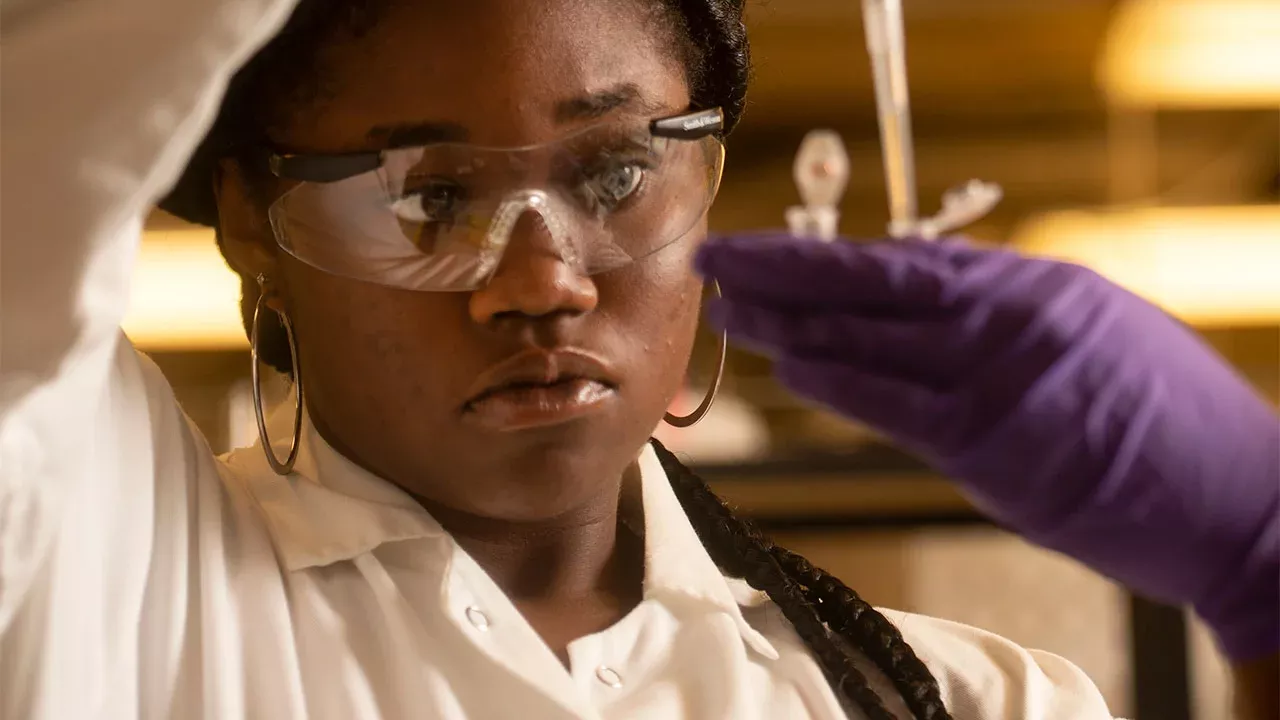
What Can I Do with a Chemical Engineering Degree?
When I was in high school, I loved my advanced science classes. Sometimes the material was tough — combustion reaction analysis takes time to understand — but I didn’t mind doing the work that it required to understand the concepts.
So, when college applications rolled around, I knew I wanted to apply somewhere within chemistry, biology or the intersection of the two. I’d also heard that majoring in any type of engineering gave me a better shot at an interesting and well-paying job after graduation.
These thoughts led me to pursue a chemical engineering degree.
What is chemical engineering?
Chemical engineering is the branch of engineering that combines principles of chemistry, physics, math and biology to develop processes and equipment for manufacturing chemicals, fuel, drugs, food and many other products.
What is a chemical engineer, and what do chemical engineers do?
Chemical engineers are people who design, develop and improve processes and products across industries while ensuring safety, efficiency and sustainability.
Growing up, I never got the chance to interact with a ChemE (insider shorthand for chemical engineer), so I wasn’t exactly sure what they did. Even now I (and I bet most of my ChemE peers) are still learning about how broad an array of industries and jobs ChemEs work within.
Here is what I’ve learned so far: oftentimes jobs in an industry are very different from the style of knowledge you learn in university.
What can you do with a chemical engineering degree?
Let me back up. After graduating with an undergraduate degree in chemical engineering, there are generally two routes students go.
The first route is graduate school, where students can earn master’s and doctorate degrees in chemical engineering. They can also pursue related engineering degrees such as material science, polymer, nuclear, etc.
The second route is industry. I think there tends to be a negative connotation of the word “industry” since it makes people think of large traditional oil and gas companies.
While there are many grads who choose to work within oil and gas, there are also many others who work in other industries like:
- pharmaceuticals
- personal care
- space
- automation
- biotechnology
- healthcare
- nuclear
- specialty chemicals
- food/alcohol production
- agriculture
- water treatment
- private equity
This list is far from exhaustive.
How do you become a chemical engineer?
To become a chemical engineer, you typically need to get a bachelor’s degree in chemical engineering. Some specific chemical engineering roles might require advanced degrees like a master’s or doctorate, especially for research, teaching or specialized positions.
As an undergrad ChemE student, you will generally spend your first two years completing general engineering courses like calculus, physics and chemistry. You can also fulfill some of your general education requirements with history, economics or psychology classes.
After that, your schedule will be filled with specific ChemE courses, including thermodynamics, heat/mass transfer and process design. These courses combine knowledge from your introductory math, physics and chemistry classes into practical, hands-on applications of engineering.
Is chemical engineering hard?
Whether you’ll find chemical engineering to be difficult depends on your individual strengths, weaknesses and learning style. Your upper-division classes will cover more specific topics and will draw on your ability to use math and physics. So, if you like those subjects, chemical engineering is the right major for you.
Here are some examples of problems you will be asked to solve:
For a heat transfer class: Analyze the total thermal resistance of a windshield heater driving down a road at 30 miles per hour. The interior of the car remains constant at 70 degrees Fahrenheit while the outside is at 25 degrees Fahrenheit.
For a fluid dynamics class: Find the exit volumetric flow rate from a pipe carrying a fluid at a given velocity around a curve with a known angle.
My favorite class so far was “ECH51: Material Balances,” which I took during my sophomore year here at UC Davis. Material Balances asks you to look at specific reactors and be able to analyze system properties (flow rate in or out, temperature in or out, etc.) given chemical makeup of inlet or outlet streams and reaction details.
At UC Davis, you will spend your last two quarters doing Engineering Senior Design. This is a capstone project where engineers design and prototype a process, device, software or product and present it to a panel of judges before your graduation.
For example, you might work on designing and changing equipment and energy specifications for beer production. You might be tweaking a water recycling system in medicine production to be eco-friendly and meet health standards.
The things you learn in class might not be heavily utilized in your future career, but it all depends on what you want to do. The students who likely use the broadest and most amount of material from an undergraduate degree in their career are those who go on to graduate school.
Where do chemical engineers work?
Chemical engineers work in a variety of industries including pharmaceuticals, petrochemicals, energy, food processing and environmental protection to name a few. Where you end up working depends on what you choose to specialize in.
ChemEs who go to grad school need to retain their broad knowledge from undergrad, take more advanced classes and conduct research with a professor. Some ChemEs with master’s and doctoral degrees choose to become professors themselves. Others will leave the world of academia and enter industries like the ones detailed above.
ChemEs who choose the industry path have many workplace options. Each person has different motivations, interests and values that push them into a variety of careers. As a Gen Z ChemE, the primary values in career choice I see among my peers tend to be work/life balance, passion for their job and high compensation.
How much do chemical engineers make?
A process engineer oversees an entire process, often within a plant or production building. They can work in oil refineries, pharmaceutical production plants, food production companies and more.
A research and development engineer invents and refines products or technologies, turning ideas into real-world applications across different industries, like:
- renewable energy
- specialty chemicals (e.g., industrial lubricants, paints and coatings)
- space
- nuclear
- biotechnology
- agriculture
- etc.
These jobs both have solid median salaries in the U.S. around 91K and 84K, respectively. As you gain experience, the compensation for these jobs goes up, generally capping around 120-140K.
As a process engineer, you won’t specifically be using the material you learned in undergrad, but you will be leveraging the problem-solving skills you developed to help identify problems and generate solutions.
The upside of being a process or R&D engineer is that you typically have a relatively high salary for well-defined work hours. This means you have set days that you’ll work on but likely won’t need to contribute immense hours outside of the workday to get ahead in the field.
This work/life balance contrasts to other careers chemical engineers can have that might pay more but have fewer clear boundaries about work hours. Oftentimes, the chemical engineers who make the most money are the ones who develop strong business expertise on top of their technical base and work their way up to senior leadership roles.
Is chemical engineering a good career?
Ultimately, industry flexibility and high income are what make getting a chemical engineering degree worth it.
Chemical engineering can be a tough major and career choice because you must have a grasp on the fundamentals of chemistry, physics and math to succeed. It also takes a minimum of four years to get a chemical engineering degree.
But the time you spend working hard and obtaining your degree can be well-worth it because you’ll have a skill set required by all industries to various degrees.
Some chemical engineering jobs are steady and well-paying while others can be more time-consuming but more lucrative. The degree, like any other, is what you make of it. But this one is unique in that it provides you with a broad set of problem-solving skills you can apply to many different industries and applications
See our chemical engineering program

Olivia Westall is a third-year biochemical engineering major at UC Davis with roots in Colorado's mountains. An avid skier and houseplant enthusiast, she dreams of innovating in genetic therapies or agriculture. Olivia values UC Davis for its supportive alumni network, especially within chemical engineering, where she serves as AIChE's publicist.
